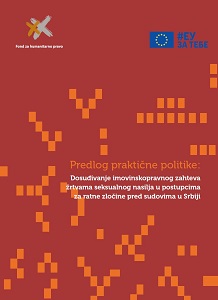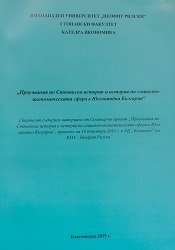
We kindly inform you that, as long as the subject affiliation of our 300.000+ articles is in progress, you might get unsufficient or no results on your third level or second level search. In this case, please broaden your search criteria.

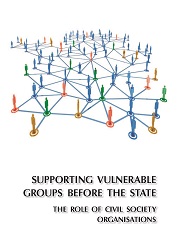
The study analyses the mechanisms for interaction between public institutions and NGOs in supporting four vulnerable groups: persons deprived of their liberty, victims of trafficking in human beings, domestic violence survivors, and persons seeking international protection and other vulnerable foreigner nationals. Furthermore, it identifies trends in the cooperation between institutions and NGOs in assisting these communities. The report sums up the profile of the bodies and organisations involved and identifies problems in their interaction. Instruments for cooperation between public institutions and NGOs in relation to each vulnerable group are reviewed in detail, both on legislative and practical level. Correlations between identified problems and aspects of the interaction between public institutions and NGOs that could help resolve these problems are highlighted. In conclusion, recommendations are made to involve civil society in providing comprehensive support, in particular legal, social and administrative assistance, to vulnerable persons. These recommendations rest on the shared experience and opinions by public authorities and civil society, as well as on applicable foreign models and good practices.
More...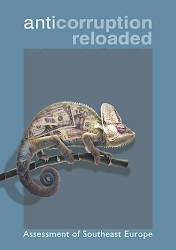
Corruption in Southeast Europe has been in the news, in the focus of public debate, and on the policy agenda of national and international institutions so often and for so long that its scrutiny hardly needs to be justified. It is precisely because it has proven to be such an intractable issue that innovative approaches to its understanding – and hence its reduction – are warranted. The EU accession prospects for the countries in the region – though distant – provide an enabling framework for action but it is local stakeholders, and in particular civil society who can bring about sustained progress in anti-corruption. The Southeast Europe Leadership for Development and Integrity (SELDI) has made the in-depth diagnosing and understanding of corruption and governance gaps in the region one of its main priorities, as a requisite condition for its advocacy of knowledge-driven anticorruption policies. This SELDI report fits in the development and implementation framework of the emerging regional anticorruption policy and infrastructure as exemplified by the SEE2020 Strategy’s Governance Pillar run by the Regional Anti-Corruption Initiative. Despite some important achievements – mostly with respect to the stabilisation of democratic institutions, the adoption of laws in key anticorruption areas, a reduction in petty bribery and growing public intolerance of corruption – anticorruption and good governance reforms are not consolidated, corruption among elected politicians and judges seems to be increasing and the enforcement of anticorruption legislation is haphazard. Anticorruption policies and institutions in the region will benefit immensely from the adoption of regular and accurate victimisation-survey based tool for measuring corruption and the rate of progress in good governance, similar to the special Eurobarometer on anticorruption, UNODC’s SEE monitoring of corruption and organised crime, and the Corruption Monitoring System employed by this report.
More...
Violent extremism is one of the major challenges Europe is currently facing. The threat is both external as well as internal as indicated by the rise in home-grown Islamist terrorists, as well as of nationalistic and anti-immigrant movements and far-right aggression. An accurate picture of the spread, nature and trends in the extremist and terrorist activity and actors is paramount to formulating strategic policy approaches and effectively allocating available resources. This publication provides a methodological framework for the establishment of a viable mechanism for monitoring and assessment of the state and developments over time in extremist acts and actors on the national level. The situational assessment is an instrument for systematic collection and analysis of statistical data, open source data and intelligence information pertaining to extremist actors and activities, for the purposes of developing regular situational reports of the spread, nature and trends in extremism and violent radicalisms. Following the application of the situational assessment tool, the publication presents main findings on extremist trends and monitoring capacities in three countries from Central and Southeast Europe: Bulgaria, the Czech Republic and Greece.
More...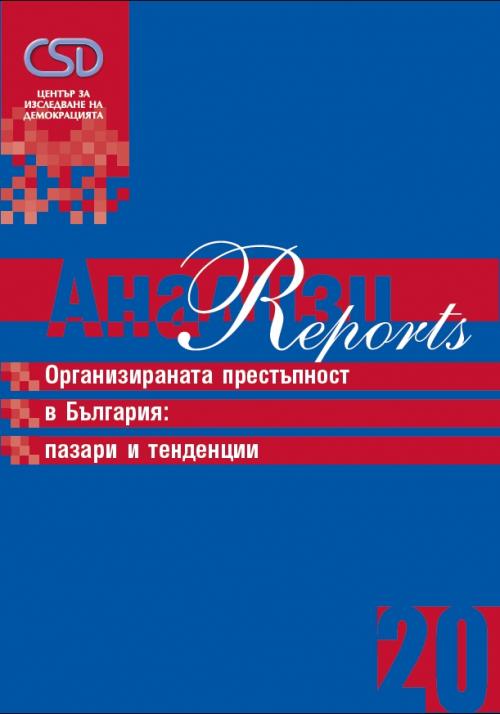
The report Organized Crime in Bulgaria: Markets and Trends summarizes the analyses carried out by the Center for the Study of Democracy throughout the last decade which have focused on specific aspects of organized crime in Bulgaria (contraband, the drug market, tax fraud, human trafficking, arms proliferation, etc.), the systemic spread of corruption, and the linkages between the two. The report presents the latest trends and manifestations (or market niches) of syndicate crime and its particularly damaging effects. It goes further to offer a historical review of the facts and available expertise in the area, and to draw conclusions about the origin, characteristics and developmental features of organized criminality in Bulgaria in the context of the transition to democracy.
More...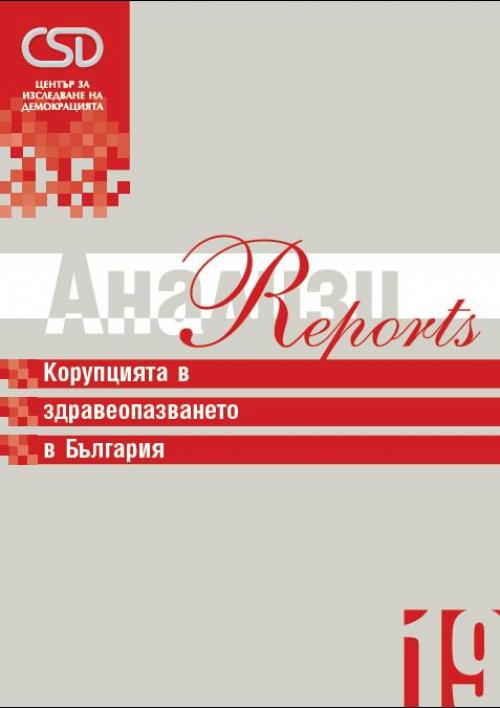
At a time of heightened social sensitivity to persisting problems in the Bulgarian healthcare system, the report examines the causes and consequences of corruption in the Bulgarian healthcare. In the context of slow institutional reforms the analysis reveals the incentives of medical personnel for corruption, as well as the size and scope of corruption in the Bulgarian healthcare sector.
More...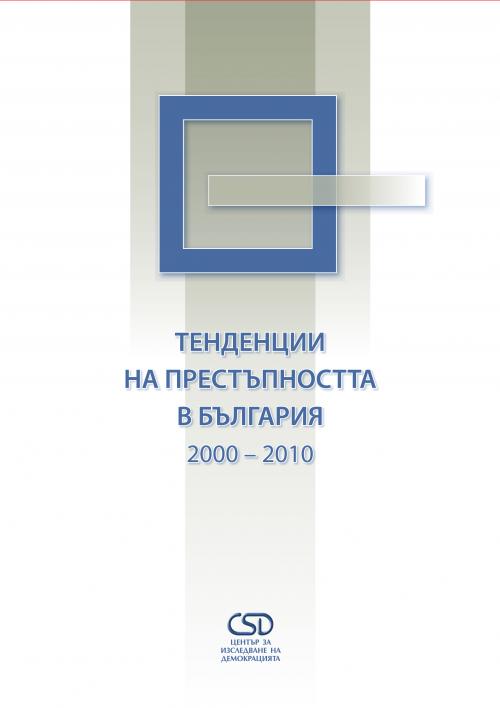
The present study examines cime trends in Bulgaria between 2000 and 2010 based on a comparison between surveys of crime victims (National Crime Survey) and police statistics. In addition to overall crime trends data, the report presents data on ten different categories of crime, as well as regional specifics of crime in Bulgaria. Criminal justice and socio-economic data is also analysed in an attempt to explain the observed trends in crime.
More...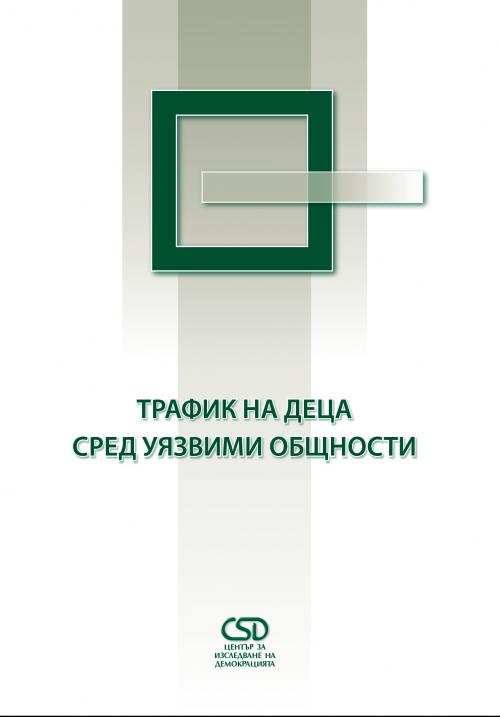
The current report looks at three specific forms of trafficking in persons: child trafficking for begging, for pickpocketing and for sexual exploitation of boys and the way they manifest themselves among Roma communities. The report examines the profiles of victims and discusses the vulnerability factors that make the Roma minority a particular group at risk. The study provides empirical knowledge on the mechanisms of recruitment and exploitation of victims in order to inform identification efforts and counter-trafficking responses. Particular attention is devoted to the policy and measures for assistance of victims. In this field, the report identifies specific gaps in assistance and the way they affect Roma victims in particular, and suggests how child victim assistance could be improved. The active involvement of Roma organisations in the research through participatory methods aimed to gain a deeper understanding of the risk factors involved, bring knowledge back to the communities and support Roma experts’ involvement in counter-trafficking policy and mechanisms.
More...
The current report, prepared by the Southeast European Leadership for Development and Integrity (SELDI) — the largest indigenous good governance initiative in SEE — makes an important contribution to the regional approach to anticorruption. It provides a civil society view of the state of corruption and comes in the wake of the 2014 SELDI comprehensive assessment of the various aspects of the legal and institutional anticorruption environments of nine SEE countries. In 2016, SELDI followed up on these assessments with an update of corruption monitoring and a special focus on state capture in the energy sector and the corruption–hidden economy nexus. The report underscores the need for broader political action for reform, which seems blocked or narrowing across the region. Inside pressure for such action has been suffocated by economic necessity and/or ethnic divisions, and the ossification of political and economic establishments. Outside pressure, delivered mostly by the European Union has been seen as wanting in relation to the size of the problems in the past couple of years due to a succession of internal and external crises. The authors underline that in none of the countries in the region has there been a clear sustained policy breakthrough in anticorruption though efforts to deliver technical solutions and to improve the functioning of the law enforcement institutions, mostly with support from the EU, have continued and even intensified in some cases. This has led to further slow decline in administrative corruption levels but at the expense of waning public support for reforms and of declining trust in national and European institutions.
More...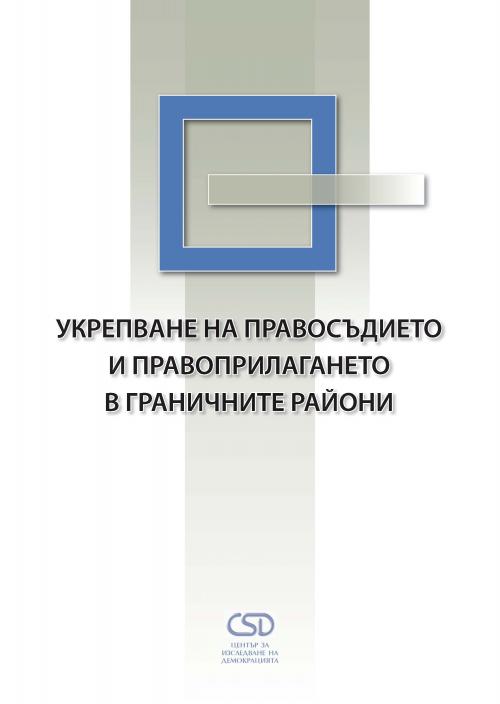
The report makes an overview of the general problems and specifics in the detection, investigation and punishment of cross-border crime, i.e. actions, connected with illegal crossing of or illegal transfer of goods across the border. The publication also presents views about the necessary measures – legislative, organizational and technical – for enhancing justice and law enforcement in the districts close to the Bulgarian-Turkish, Bulgarian-Macedonian and the Southern Black Sea borders.
More...
In prison, certain groups of inmates are subject to disadvantages due to specifics of their origin, gender, sexual orientation, age, etc. These groups usually need special treatment, which is not always provided, which leads to unequal treatment and violation of their rights. This handbook examines the situation of such vulnerable groups within the prison systems of Belgium, Bulgaria, Germany, Lithuania and Spain. Starting from the classification of the UN Handbook on Prisoners with special needs and looking at the different national contexts, the authors identify different groups as vulnerable in different countries. In order to encompass as many groups as possible, their list was extended to include some particularly marginalised groups, such as sex offenders, prisoners with disabilities, etc. Each group is viewed in context, explaining the situations of vulnerability both generally and in the selected countries. From one side, the handbook presents the efforts for compensation of vulnerabilities in every country available in the legislation or provided by prison authorities or other actors. From the other side, it identifies the gaps in the measures and practices, which vary both from country to country and from group to group.
More...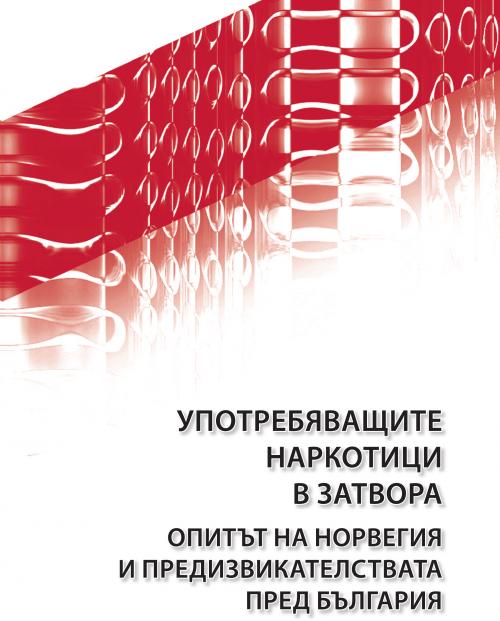
Publication looks over the situation of drug users in two European countries – Norway, known for its social and welfare-oriented state, and Bulgaria, which since the beginning of the transition from totalitarism to democracy lacks sustainable policies on prisons and drugs. The aim of this work is to comparatively present the penal policy towards drug users and the measures taken for convicted people addicted to narcotic substances, to identify those features which can be transferable and can assist Bulgarian authorities to improve the situation of drug users in and outside the prison. Finally, this research will try to propose concrete measures to be taken both within the penitentiary system and as crime prevention efforts among drug users.
More...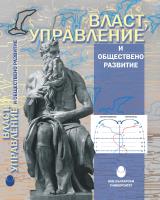
The conference is addressing the following problematic issues: - Supply of conceptual schemes, parameters and theoretical-applied models of different global risks – inequality and social cohesion, demographic crises, migration waves, employment; - Discuss effective political, economic and governance approaches (models) for implementation into society -integration, human capital, business environment, sustainable development and corporate social responsibility (CSR); - Draw global, regional, national priorities and trends with economic, political, social, cultural and environmental dimensions.
More...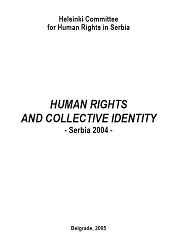
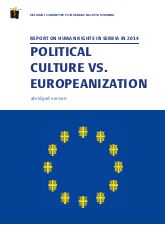
Serbia is once again at crossroad that calls for the engagement of its entire society. The steps the government has made toward EU accession are insufficient, the more so since the government itself is not unanimous about the course. This is more than evident in the implementation of the Brussels Agreement. The great majority of citizens knows nothing or knows little about what a membership of EU implies. Besides, most major national institutions such as Serb Orthodox Church, parts of the Serbian Academy of Arts and Sciences (now trying to change its course), influential intellectuals and parts of the civil sector are not committed to the values on which EU rests. Turbulence within EU itself and disorientation of some member-states play into the hands of EU opponents and fuel their resistance. Human rights and freedoms have regressed considerably over the past three years, the backsliding itself escalating during the state of emergency declared because of floods (May 15-23, 2014) and in the aftermath. Requiring expertise and, above all, preventive measures, the crisis situation itself revealed the government’s weaknesses and its attitude toward key issues of further democratization.
More...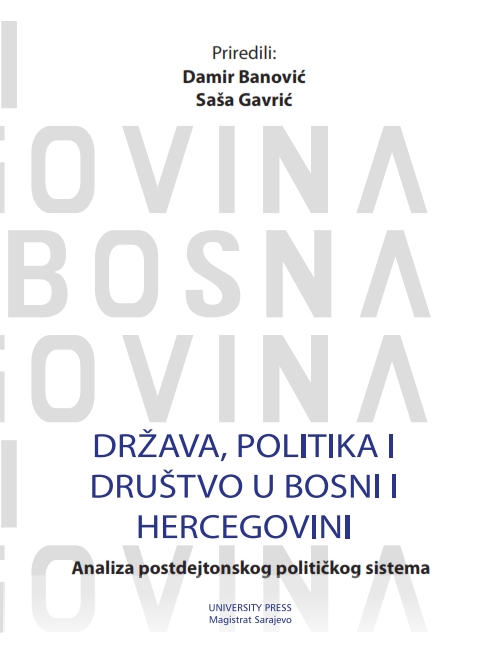
Državna struktura Bosne i Hercegovine u međunarodnoj stručnoj literaturi smatra se kompleksnom i nefunkcionalnom. nerijetko, ova država se zbog administrativne podjele naziva“monstrumom“ ili “haotičnom demokratijom“. a unutar Bosne i Hercegovine i samo stanovništvo je skeptično u odnosu na državu i njene strukture. stoga političari zahtijevaju radikalne reforme, kojima bi država bila uređena kao centralistička, federalna ili decentralizovana država. većina tih zahtjeva je nerealna, budući da ih je nemoguće usuglasiti, tako da nema konsenzusa o budućnosti Bosne i Hercegovine i njenoj unutrašnjoj strukturi. [...]
More...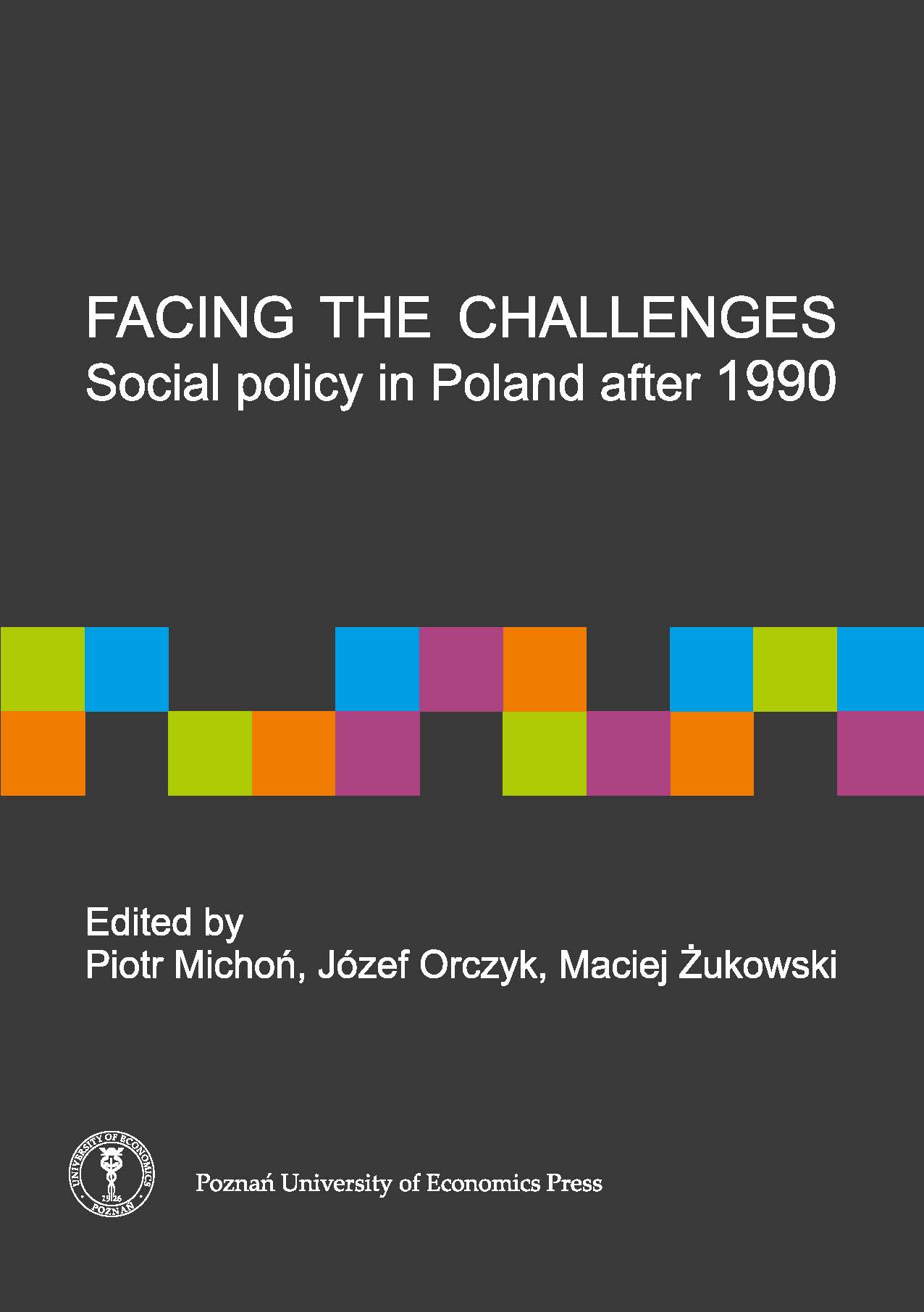
Polish social policy is changing not only in the material sense but also on the level of public consciousness. This concerns not only citizens, but also researchers and policy makers. Social policy in Poland after 1990 has its own specificity. One of its features are the lack of clear direction of development and the constant need for amendments. Unsurprisingly, diversity of approaches can be also found on the cognitive level, although it is not reflected in all sets of studies. This regards not only ideological differences and various appraisals of the same facts, but also the often underestimated domination of particular paradigms. The latter can be discerned in this monograph as well, as the effect of the authors’ provenance and the widespread approval of certain ways of thinking about and analyzing particular fields of social policy. The monograph has been divided into two parts. The first consists of the general studies of changes that took place on the institutional level and in public consciousness. The second part focuses on evaluating changes that occurred in particular fields of social activity which are strictly connected with the state’s social policy. The selection of those fields and the dissimilarity of approaches should encourage the reader to reflect upon thevariability of importance of material and consciousness factors in evaluating social policy (Józef Orczyk, Foreword).
More...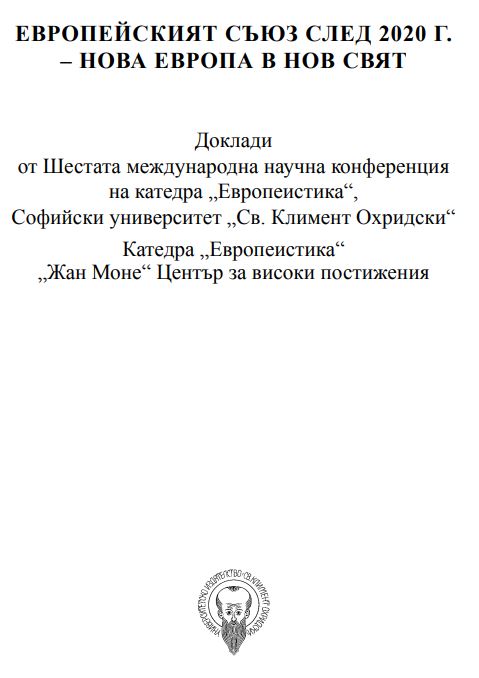
This book presents reports from „EU Post 2020 – New Europe in a New World“, Sixth International Scientific Conference of the European Studies Department, Faculty of Philosophy at Sofia University “St. Kliment Ohridski”, Jean Monnet Centre of Excellence. The conference was held in May 2019 with the support of Hanns Seidel Foundation and Erasmus+ programme.
More...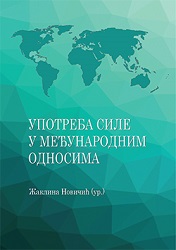
This thematic collection represents an attempt to systematically address some issues related to the use and exploitation of armed force, which is one of the central themes of international relations. The contemporary international context is constantly changing, and after the end of the Cold War there was a tendency to increasingly talk about the superiority of force in the era of globalization, that is, about the predominance of so-called non-military security threats. Unfortunately, practice shows that traditional armed force is a constant companion of international relations, which proves the justification, both social and scientific, for now, towards the end of the second decade of the 21st century, to re-examine some of the fundamental concepts and practices of international relations related to its use...
More...